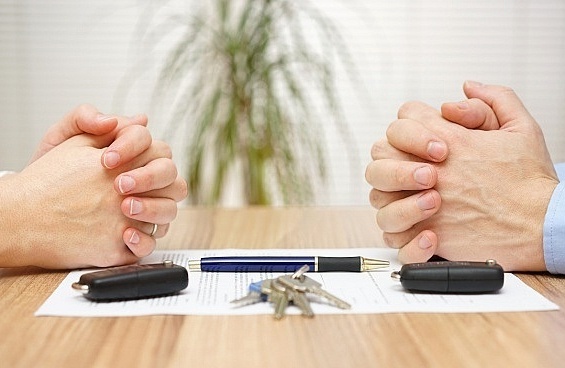With nearly all of the U.S. population forced to quarantine at some point during the past few months due to the coronavirus pandemic, many marriages are beginning to show signs of wear and tear that they may not be able to come back from. In addition to the typical stressors such as money worries, raising children, and dividing up chores, many couples have had to confront how they truly feel about each other. Consequently, family lawyers across the nation anticipate an avalanche of divorce cases as soon as the court system fully reopens for business.
In one of the more high-profile marriage casualties of the Covid-19 era, Mary-Kate Olsen filed for an emergency divorce from her husband Olivier Sarkozy in New York City. The former Full House star went so far as to claim that she feared she’d lose access to her things and her apartment during the pandemic. However, she was denied because her request was not considered essential business for New York City’s courts.
A Divorce Boom
While it’s far too early for any reliable statistics on divorce due to coronavirus, early indications from lawyers suggest that it has the potential to push the nation’s divorce rate of almost 50% even higher. Many lawyers and counselors say they’ve had a surge in calls from clients that want to end their marriages as soon as they emerge from lockdown.
A New York City clinical psychologist specializing in divorce reports that instead of getting three to five calls a week from people talking about divorcing, she’s getting three to five calls a day since the start of the outbreak. While much of this could be a reaction to the upheaval of stay-at-home orders and rising unemployment, it should keep divorce lawyers very busy as their offices get back to full strength.
How Do Pandemics Lead to Divorce?
Essentially, a lockdown translates into couples spending all of their time with each other whereas they used to spend a fraction of that time together. Typically, a working couple sees each other briefly in the morning and then for about two to three hours in the evenings. While they have more time with each other on weekends, those days are often filled with activities and tasks not completed during the week.
Being forced to stay home, however, means that they must deal with each other constantly. As a result, it tends to highlight whatever is missing in a marriage. Things that may have been overlooked or excused in the past no longer get the same treatment when there’s little else demanding one’s attention.
Financial Stress Pushing Marriages to Breaking Point
Along with forced confinement, the financial headaches resulting from shutting down our economy may also push many marriages over the edge. While scores of people have been forced into unemployment due to businesses closing, many of them may not have the coping skills to keep this setback from spilling over into their relationship. In addition to being behind on rent or a mortgage, some people are also staring down bankruptcy regardless of when we get the economy back on track. As a result, we’ve already seen a spike in domestic violence cases.
China Already Seeing Divorce Upsurge
As soon as China gained a foothold against the coronavirus, it started to see an increase in the number of couples trying to divorce. For example, the cities of Xian and Dazhou in the Sichuan province both reported a record amount of divorce filings at the beginning of March, which led to significant backlogs at government offices.
Interestingly, this kind of behavior is not unusual in the wake of a pandemic. Recent history shows that divorce rates continue to rise even as a disease outbreak subsides. For instance, a year after the SARS epidemic in Hong Kong the divorce rate was 21 percent higher than the year prior to the outbreak.
Coronavirus Changing the Way Courts Operate
While people may endure longer wait times as courts adopt new safety measures and wade through months of backlogs, they may also experience a legal system that is unrecognizable to anyone who did business before the pandemic. As video conferencing becomes standard for hearings, depositions, and other civil legal proceedings like divorces, attending court virtually will become commonplace.
While some courts will be quicker than others to adopt newer technology, the pandemic has forced many traditional courts and judges to embrace tools such as Zoom as a substitute for in-person courtroom exchanges. In Houston for example, uncontested divorces are handled with electronic affidavits and digital signing systems and no video calls. Some mediators use Zoom to create virtual rooms with virtual doorbells for opposing sides and another room in which attorneys and mediators can discuss the issues.
The ability to do business virtually has many lawyers hoping such changes are here to stay. Indeed, one judge remarked that the new technology has practically eliminated the hassle of clients running late for court due to traffic or parking issues.
Conclusion
While it is unlikely that anyone will divorce solely because they were sequestered with their spouse for a couple of months, quarantining may have simply sped up what was inevitable. In ordinary times, daily routines often distract couples from fundamental problems in their relationships. Times of heightened emotions and stress such as these, however, draw attention to problems and force many couples to the point of no return.
Nevertheless, the coronavirus pandemic may welcome a sea change in the way divorces are handled by the courts. By embracing new technology, courts could become more efficient and ultimately less costly for the parties involved. Furthermore, this crisis might also offer hope for a few marriages. Some lawyers have actually heard from couples that facing a deadly virus together actually made them want to work harder on their marriages.
References
For videos from Ty Hyderally on employment law and returning to work under Covid-19 guidelines, please visit his YouTube channel: https://www.youtube.com/channel/UCqsLR5wdZZDZke7sKu71fsw




